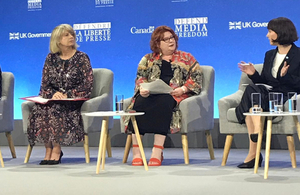UK aid “bold new support” to promote media freedom around the world
UK aid will help media experts, charities, the private sector and academics, to pioneer new approaches to keeping media outlets free and independent.

International Development Minister Harriett Baldwin at the Global Conference for Media Freedom.
A new UK aid package is to help promote media freedom in developing countries around the world, International Development Minister Harriet Baldwin has announced today (10 July 2019).
One programme will look at creative ways for independent media outlets in countries such as Ethiopia, Bangladesh and Sierra Leone to develop better business models, by helping them for example to cut production costs and find new funding streams.
Another will encourage community groups and journalists to work together to develop strong, independent media outlets in countries, where historically journalists have enjoyed less freedom.
Last year was the worst on record for violence and abuse against journalists. In more than half of such attacks over the year journalists were deliberately targeted. There was also a 15% increase in the killing of journalists in 2018, compared to 2017, according to Reporters without Borders.
In the last 15 years, over 1,000 professional journalists have been killed for doing their job around the world.
This, combined with political and commercial pressures, has led to a global crisis in independent media outlets in developing countries.
International Development Minister Harriett Baldwin said:
At a time when journalists are attacked in record numbers, and too many independent media organisations are collapsing or threatened by political interests, today’s aid package could not be more crucial.
UK aid will help media experts, charities, the private sector and academics, to pioneer bold new approaches to keeping media outlets free and independent, and give them the power to report the truth.
This is in everyone’s interests. If people are able to hold their governments to account using reliable information, they can better understand their rights and demand better services, such as healthcare and education.
The Governments of the UK and Canada are co-hosting the Global Conference for Media Freedom today and tomorrow (10 and 11 July 2019) which aims to defend media freedom and improve the safety of journalists across the world.
This new support will build on DFID’s existing work to protect media freedom in developing countries, which has already helped to:
- give 283.5 million people in 15 fragile, poor and conflict affected countries access to TV, radio, and online outlets, whilst supporting 135 stations to strengthen their content to help citizens understand their rights and hold government and other power holders to account
- support media and research institutions to improve the environment for small and medium sized Nigerian media enterprises to work in
- ensure public debates on independent media can take place during free and fair Presidential, Parliamentary and Local Government elections in Sierra Leone in 2018
Notes to editors
Today’s new UK aid package of up to £15 million will be provided by the Department for International Development. This includes up to £12 million for a consortium led by BBC Media Action to help existing media improve their business models. Up to another £3 million will go on the Aswat Horra programme, headed up by The Institute for War and Peace Reporting, which will support media outlets in countries where a free media is less established.
DFID is strongly committed to developing strong and free media institutions as a vital part of achieving Global Goal 16, to support peace, justice and strong institutions.
The new programmes come on top of an announcement for £12 million made in March 2019 for the PROTECT (Protecting Rights Openness and Transparency, enhancing civic transformation) Programme which aims to improve media freedom within developing countries. In total, DFID has committed up to £27 million to protect media freedom this year.
General media queries (24 hours)
Email mediateam@dfid.gov.uk
Telephone 020 7023 0600
If you have an urgent media query, please email the DFID Media Team on mediateam@dfid.gov.uk in the first instance and we will respond as soon as possible.